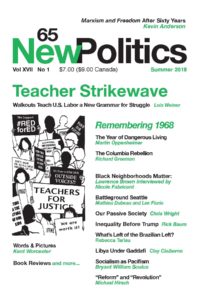 This memoir of sorts by Fordham University sociology professor Heather Gautney, who became a policy fellow in Bernie Sanders’ Washington DC office and a volunteer researcher and organizer for his unexpectedly popular 2016 presidential campaign, has a very specific focus: to “offer insights from up-close work with Bernie, mixed in with historical and sociological analysis, to perform an autopsy of the 2016 election” (2). Given the sheer number of insightless (to put it mildly) autopsies that have been proffered across the political spectrum—perhaps none more useless than Hillary Clinton’s own What Happened (Simon & Schuster, 2017)—Gautney’s book is more than welcome and even slightly overdue.
This memoir of sorts by Fordham University sociology professor Heather Gautney, who became a policy fellow in Bernie Sanders’ Washington DC office and a volunteer researcher and organizer for his unexpectedly popular 2016 presidential campaign, has a very specific focus: to “offer insights from up-close work with Bernie, mixed in with historical and sociological analysis, to perform an autopsy of the 2016 election” (2). Given the sheer number of insightless (to put it mildly) autopsies that have been proffered across the political spectrum—perhaps none more useless than Hillary Clinton’s own What Happened (Simon & Schuster, 2017)—Gautney’s book is more than welcome and even slightly overdue.
Whole Number: 65
What I Saw at the (Political) Revolution
Radical America
Why the United States has not developed a permanent socialist movement has perplexed activists and theorists for more than a century. Paul Le Blanc takes up that query as an activist who wants to see an anti-capitalism mass movement take shape in twenty-first century America. To that end, he investigates some of the moments when the possibility of a significant left presence in the United States seemed at hand. He focuses on what made those movements viable and what thwarted their long-term success. The volume’s fourteen essays were written over a period of thirty years, from 1986 to 2015.
Class DOES Matter

Steve Fraser is a weathered veteran of the New Left and many subsequent movements, author of shrewd books on the acquisitive ruling class and also of the outstanding biography of famed left-leaning labor giant Sidney Hillman, among other works. Here he once again ranges far, but also comes close to home, his own personal home space.
Black Neighborhoods Matter

Lawrence Brown associate professor of public health in the School of Community Health and Policy at Morgan State University. He is the grandson of sharecroppers who lived in the Mississippi Delta and a native of West Memphis, Arkansas. He is a historian, critical geographer, and political economist who sees public health from a critical, interdisciplinary perspective and advocates for holistic approaches to healing the Black communities of Baltimore. His book The Black Butterfly: Why We Must Make Black Neighborhoods Matter (Johns Hopkins Press) is forthcoming.
What’s Left of the Brazilian Left?

In May 2017, Left politics in Brazil were pretty bleak. It was almost a year after the impeachment of President Dilma Rousseff of the Brazilian Workers Party (PT), whose ousting from power brought along with it an onslaught of austerity policies.2
Walkouts Teach U.S. Labor a New Grammar for Struggle

Like the Arab Spring, the U.S. “Education Spring” was an explosive wave of protests. Statewide teacher walkouts seemed to arise out of nowhere, organized through Facebook groups, with demands for increased school funding and political voice for teachers. Though the walkouts confounded national media outlets, which had little idea how to explain or report on the movements, for parent and teacher activists who have been organizing against reforms in public education over the past four decades, the protests were understandable, if unexpected. What was surprising was their breadth of support (statewide), their organizing strategy (Facebook), and their breathtakingly rapid spread.
"Marxism and Freedom" After Sixty Years, For Yesterday and Today

It is the sixtieth anniversary of Raya Dunayevskaya’s Marxism and Freedom, a work both of its time and ahead of its time.
Battleground Seattle
 Labor is prior to, and independent of, capital. Capital is only the fruit of labor and could never have existed if labor had not first existed. Labor is the superior of capital and deserves much the higher consideration. – Abraham Lincoln
Labor is prior to, and independent of, capital. Capital is only the fruit of labor and could never have existed if labor had not first existed. Labor is the superior of capital and deserves much the higher consideration. – Abraham Lincoln
Inequality Was Increasing Before Trump

The Federal Reserve Board, the bankers’ bank, has put out figures and reports showing that even before the Trump regime, the rich were acquiring a larger share of the nation’s total income and wealth. The September 2017 Federal Reserve Bulletin reports that “the distribution of income and wealth has grown increasingly unequal in recent years.”1 Other government reports show that many continue to live in poverty and lack shelter and an adequate amount of food.
Political Visual Narrative

This season’s roundup of nonfiction comics includes self-published and small-press titles as well as noteworthy releases from major trade publishers. Topics covered range from consumer capitalism and imprisoned anarchists to Trinidadian social history and the war in Syria. Each of these titles deploys a distinctive approach to the challenge of folding political themes into visual narrative. In different ways, these books suggest that the forward march of political cartooning continues unabated.
Our Passive Society

Sitting alone in my room watching videos on YouTube, hearing sounds from across the hall of my roommate watching Netflix, the obvious point occurs to me that a key element of the demonic genius of late capitalism is enforcing a crushing passiveness on the populace.
Socialism as Pacifism

At time of writing, we are still in the dissipating wake of another mass shooting in the United States, this time in a Parkland, Florida, high school. The American people are once again reminded of the ubiquitous threat of violence that characterizes their everyday lives. We are once again confronted with the nauseating reality of a two-party system that defends this violence in word and deed—while providing rhetorical paeans to security, freedom, and safety.
Reconnecting Reform and Revolution: Socialists in the Mist

If one thing was clear coming out of the New York City Democratic Socialists of America’s May 5 convention, it was that most delegates uniformly consider themselves socialists and aspire to build an anti-corporate resistance movement nationwide. So far, so good.
From the Editors
After protests and occupations temporarily shut down ICE offices, Donald Trump suffered a significant political defeat when he was forced to reverse himself on separating immigrant children from their parents after they were arrested at the border. By and large, people were horrified at the separation of kids from their families and at the creation of what were basically prison camps for children. Polls showed that only about a quarter of the U.S. population supported Trump on this child-hostage policy, though about half of Republicans did.
Libya under Gaddafi

A CNN report last November about slave auctions in present-day Libya shocked the world.1 The existence of these slave auctions was widely treated as a new development in the country and a result of the chaos that resulted from the NATO-supported overthrow of Colonel Muammar Gaddafi. In truth, however, what CNN discovered is but a surviving remnant of Gaddafi’s regime—the Libyan Arab Jamahiriya—a police state with systematic racism and abuse both of Libyans of sub-Saharan African descent and of sub-Saharan African migrants.
New Politics Vol. XVII No. 1, Whole Number 65

From the Editors
Walkouts Teach U.S. Labor a New Grammar for Struggle, Lois Weiner
What’s Left of the Brazilian Left: Reasons for Cautious Optimism from the Landless Workers Movement, Rebecca Tarlau
Special Section: Remembering 1968
1968: The Year of Dangerous Living, Martin Oppenheimer
The . . .
The 1968 Columbia Rebellion

— Reprinted from New Politics, vol. VI, no. 3, #23, Summer 1967 (printed June 1968)
At 4 am on April 30 [1968], my wife and I stood with tears streaming down our faces on the corner of Amsterdam Avenue and 117th Street, watching the last of the Fayerweather Hall sit-ins being tossed into waiting police vans. We were not the only ones crying, nor were the tears merely those of pity or self-pity. There was also anger, frustration, and actual joy. The incredible—and inevitable—had happened; the “Big Bust” had come. Seven hundred and twenty student and faculty protesters were under arrest; more than 130 had been beaten up, some quite badly. The last illusions about what was happening were shed.
1968: The Year of Dangerous Living

— Reprinted from New Politics, vol. II, no. 2 (new series), #6, Winter 1989 —
Introduction
By Martin Oppenheimer
“The Year of Dangerous Living” was written for the twentieth anniversary of 1968. The “’68ers” were still young in 1988, in the prime of their lives, and memories were fresh. There was an explosion of protests against campus racism, gay-bashing, and increasing corporatization of universities (including union-busting). These baby-boomers, then hitting the big 4-0, were nostalgic. There was a sense that despite a Republican president, the moment was ripe for new efforts that required a serious appraisal of past campaigns.
